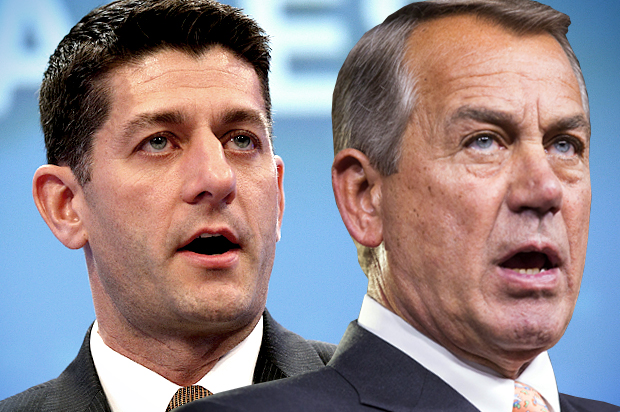We don’t really hear as much about the Affordable Care Act as we used to. With the 2014 election cycle behind us and the 2016 cycle still puttering along in first gear, there’s no constant drumbeat of campaign-trail Obamacare invective to drive headlines. What’s more, the law is, at this point, functioning very smoothly, and the lack of website crashes and other sundry foul-ups necessarily translates to less press coverage. Nobody really cares too much when a law works as intended.
In fact, the ACA is going through a noticeable upswing in its public image. Obamacare’s approval rating has, per the Kaiser Family Foundation tracking poll, risen eight points since September 2014, while disapproval of the law has fallen 11 points since its high point in July 2014. And people who purchased their insurance through the ACA give fairly good reviews on the quality of their coverage. Meanwhile, the uninsured rate across the nation continues to drop.
But that doesn’t mean there isn’t any drama to be had. After all, the law’s fate is still very much in question – in less than two months, the Supreme Court will hand down its ruling in King v. Burwell, determining the fate of the ACA’s health insurance subsidies in the vast majority of the states. If the subsidies go down, lots of people stand to lose their insurance, and it’s doubtful the ACA would survive. This outcome is exactly what Republicans and conservatives have been pushing for. And as they get closer to realizing this dream, they’re becoming more and more terrified of what might happen.
“For conservatives, the expected June Supreme Court decision in King v. Burwell is laden with opportunity and peril,” begins a new memo from The 2017 Project, a conservative activist group pushing for the repeal of Obamacare. The memo itself deals more with the perils than the opportunities, warning conservatives that they’ll need a plan to prevent too much disruption in the health insurance markets, and dismissing the temptation to simply sit back and let Obamacare collapse in the event of a ruling against the government in King. “The let-it-burn approach may feel cathartic,” the memo states, “but it will hurt the cause of repeal by showing the public that conservatives have no solutions on health care.”
However, the simple fact that a conservative group is putting out a strategy memo this late in the game, warning Republicans that they need to coalesce around a post-King plan, is a fairly good sign of how unlikely it is that that will actually happen. The only thing holding Republicans together on healthcare policy is a shared hatred of the Affordable Care Act. Beyond that, they have no idea what to do.
Right now there are no fewer than four potential post-King plans being floated by Republicans in Congress, and they’re all very different, ranging from a temporary extension of the ACA’s subsidies to a full-blown restructuring a state healthcare markets. The thinking behind these proposals is that they’ll buy time and political cover for the GOP as it finally figures out what the hell it intends to with regard to healthcare policy – a feat that’s eluded them for several years running. While they try and figure it out, the stopgap measures would allow for some of the worst features of the pre-ACA healthcare landscape to creep back in.
And as my colleague Jim Newell points out, before they can agree on which approach is best, they first have to get past conservative opposition to even considering something that isn’t a full-blown Obamacare repeal. The budget reconciliation process offers Congressional Republicans a one-shot opportunity to obviate a Democratic filibuster and get healthcare legislation to President Obama’s desk. The hardline conservatives are dead-set on using that opportunity to force Obama to veto a full repeal – a politically satisfying gesture that would do absolutely nothing to mitigate the damage from an adverse ruling in King. The slightly more practical Republicans in Congress are wondering if they shouldn’t use it to pass an Obamacare “patch” or “bridge” or whatever they’re calling these stopgap plans.
And it gets even more complicated! As the Washington Examiner reported yesterday, if the Republicans wait until after the King decision comes down to pass their contingency plan, the Congressional Budget Office “will no longer assume that the subsidies are valid, meaning that Congress would have to pay for their legislative response for the people losing subsidies by cutting spending elsewhere or increasing the debt.” So now they’re worried about having a fight over paying for additional spending that could be viewed by conservatives as a sneaky way of keeping Obamacare temporarily alive.
The Washington Post’s Greg Sargent neatly mapped out the political minefield Republicans have to navigate:
They openly rooted for a Court decision gutting subsidies. But now they don’t want to sustain political damage from millions losing insurance. So they are floating all manner of contingency plans that would require spending federal money to temporarily cover those millions. But it will anger conservatives if they spend federal money to expand health coverage, because they oppose that in principle and — perhaps worse — it could keep Obamacare going.
The natural response to all this is what we’ve seen for the last six years from the GOP on healthcare policy: paralysis. They focused so singularly on the destruction of Obamacare that they didn’t put any time into actually building a consensus on their own policy. Presented with the chance to realize their dream of a post-Obamacare world, they can’t figure out what to do, and there’s a real possibility they’ll get burned.

